|
|
 
|
Links to Liberia
Gateway
P
|
Liberian Internet Pages
Click and Go
|
SPECIFICATIONS
|
|
Next Link Page
|
Links in Alphabetic order
[A]
[B]
[C]
[D]
[E]
[F]
[G]
[H]
[I]
[J]
[K]
[L]
[M]
[N]
[O]
[P]
[Q]
[R]
[S]
[T]
[U]
[V]
[W]
[X]
[Y]
[Z]
|
|
Kaikpai Paasewe's Home Page

|
Kaikpai (E. Kaikpai Paasewe) is a drummer, dancer, choreographer, and storyteller of the Vai ethnic group which migrated from the Mali empire into coastal region of West Africa now called Liberia and Sierra Leone.
|
|
Dawn Padmore

|
Dawn Padmore, Liberian-born soprano is a versatile singer. Her Toronto debut recital was reviewed by the Toronto
Star as a "series of musical confections smartly wrapped in a silky soprano". As a featured soloist in the
world premier of Akin Euba's opera, Orunmila's Voices, with the Jefferson Performing Arts Society Orchestra,
Ms. Padmore's performance was considered "a highlight of the evening" (New Orleans Times-Picayune). Ms. Padmore received
her B.A. in Psychology and Music from the University of Delaware, and completed her Master of Music in vocal performance
at The University of Minnesota School of Music.
|
|
The Palava Hut
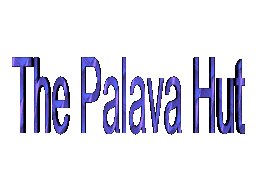
|
The Palava Hut as a fearless medium for the bold expression of ideas, seeking to fill the void created by the tyranny of a minority hoodlum class that has driven the voices of conscience underground in Liberia and many parts of Africa.
|
|
Pax Christi
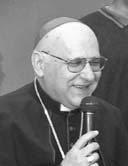
Patriarch Michel SABBAH
President Pax Christi Int.
|

Pax Christi International is a non-profit, non-governmental Catholic peace movement that began in France at the end of World War II. Today, it is comprised of autonomous national sections, local groups, and affiliated organisations spread over 30 countries and 5 continents, with over 60,000 members worldwide. The movement works in all areas of peace but has a specific focus on demilitarisation, security and arms trade, development and human rights, and ecology.
|
|
Won-Ldy Paye
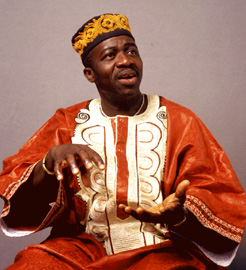
|
Won-Ldy Paye is a multi-talented artist from Tapita, in the northeastern region of Liberia, West Africa.
He is a member of the Tlo Ker Mehn, the class of professional
Dan entertainers who are keepers of the oral tradition. He was trained by his grandmother-Gowo to
remember and retell the stories of the Dan people. As a child Won-Ldy learned drumming, instrument
making, dancing, wood carving, mask making, fabric dyeing, and mural painting-the traditional arts
and knowledge that nourish and entertain every Dan person. In addition, he studied reading, writing,
and arithmetic-the skills he needed for the world beyond Tapita.
|
|
Angela M. Peabody
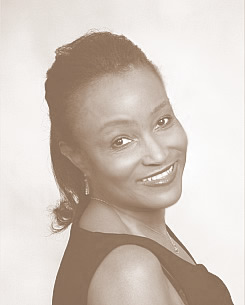
|
Angela M. Peabody was born and raised in Monrovia, Liberia. Her mother, who was mayor of the city of
Marshall and her father, a longtime politician helped to shape Angela’s world and her interest in reading
and writing. Now, Angela excitedly releases a second edition of Exiled in paperback, with a few additions
and twists that readers will find exhilarating. The book Unconditional Love was born of Exiled’s lead character,
Madia Tailgate. The contents truly support the title with 12 inspiring poems written by Angela and her
life-shattering story of surviving the 1980 coup d’etat in Liberia.
|
|
Peace Child
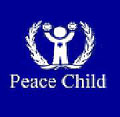
|
Peace Child International empowers children to take responsibility for peace, human rights and the environment through education, leadership development and direct participation in the events that shape our world community. Peace Child gets its name from a tradition In Papua New Guinea, when warring tribes of head-hunters made peace, they each exchanged a child. The children would grow up with the others' tribe and if in the future, conflict threatened between the tribes again, those children would be sent to negotiate. Such a child was called a "Peace Child." This legend represents the important role we believe young people can play in changing the world.
|
|
Peace Corps Training

|
Seventy-three prospective volunteers first met in Philadelphia, Pa. on December 12, 1975. After two days of inoculations an some cultural awareness training, we departed for Liberia. The Pan Am jet landed in the middle of the following day, and as I stepped off the plane my glassed fogged up from the heat and humidity.
|
|
Alexander Peal
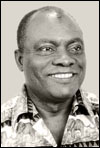
|
The Goldman Environmental Prize 2000 winner is the former goalie for the Liberian national soccer team,
Alexander Peal who has used his public image as a soccer star to the advantage of the conservation movement.
In the mid-1980s he launched
a national conservation education program. This momentum was stalled, however, in 1989,
when civil war forced the collapse of civil society and the country was ruled by chaos and terror.
|
|
Pepperbird Magazine

|
The Pepper Bird Magazine gets its name from the pepper bird which is a small yellow songbird on the West African coast. The Pepper Bird is the national bird of the Republic of Liberia. The Pepper Bird Magazine is published quarterly: January - March, April - June, July - September, and October - December. In February a special edition is published for Black History Month.
|
|
Ruth Perry
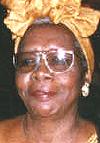
|
Full name, Ruth Sando Perry; born July 16, 1939, in Grand Cape Mount, Liberia; daughter of Marjon and AlHaji Semila Fahnbulleh; married McDonald Perry (a judge and legislator); seven children. Education: Graduated from the Teachers College of the University of Liberia. Religion: Muslim. Memberships: Women Initiative in Liberia, Women in Action for Goodwill, Association of Social Services. When Ruth Perry was sworn in in 1996 as head of an interim government in Liberia, the former teacher, bank executive, and senator became the first female head of state in contemporary Africa. Yet Perry's next challenge was a difficult one: seventeen years of political conflict and seven years of civil war had brought the once-prosperous West African nation to its knees. Viable businesses, social services, and the personal safety of Liberian citizens had disappeared. Perry's task was to lead Liberia though a peace process that would culminate in 1997 elections.
|
|
The Perspective

|
The Liberian Democratic Future (LDF) is a group of Liberians from different ethnic backgrounds, genders, religious beliefs and political persuasions who are dedicated to pluralistic , democratic Liberia. The Liberian Democratic Future has great passion for democracy, peace with justice and equal opportunity for all Liberians, which are not only necessary but in deed critically imperative if we are to transcend the wounds and deep division of our civil conflict. In recognition of this national need, LDF has decided to launch a medium of dialogue
|
|
Petition for Liberia

|
Petition for Liberia
Pursuing Peace and Reconciliation in Liberia:
A Petition to the International Community, the U.S. Government, and Representatives of the Liberian Government, Liberians United for Reconciliation and Democracy (LURD) and the Movement for Democracy (MODEL). We, the undersigned citizens and residents of the United States (U.S.) call on the international community to: (READ MORE)
|
|
Police Badge
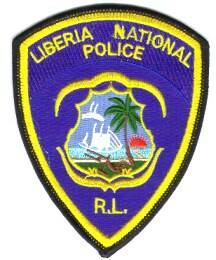
|
Liberian National Police Badge.
|
|
Poro Society

|
Current estimates contend that up to half of Liberia’s population is a member of one secret society or another,
including past presidents such as William Tolbert. The poro secret society is/was secret in the sense of a special
admission rite was prescribed and what happened
in the society could not be divulged. The most important role of this society was the separate education of
the adolescent boy and girls and the final admission of each into an adult society. These societies are so secretive
that they may well be one of the reasons Liberia was able to resist colonization attempts. The punishment for
revealing society secrets to any outsider reportedly ranges from banishment to death.
The role of the poro society was religio-social. It had also great political power in Liberia. The
ceremonial mask left was produced by one of the tribes-members of the poro society, possibly by Mano and was probably
used in initiation ceremonies. When the youngsters in a tribe reach adolescence, they are indoctrinated into
"bush schools". These are run by the secret societies in order to initiate the teens into
adulthood and to teach tribal values and traditions, as well as other skills they will need as adults.
Depending upon the ethnic group, this indoctrination may take
anywhere from a few months to three years. Upon graduation, the young adults often enter the outside world
covered in white body paint that is thought to make them invisible to evil spirits.
There are no detailed accounts of the curriculum of the bush school. The three or four years that youngsters
spend are organized by town elders who are leaders in the secret societies that control a variety of esoteric
information.
This material cannot, on pain of death, be communicated to outsiders. However, youngsters learn to farm,
construct houses, track animals, shoot birds, and carry out a variety of adult economic activities
(children live apart from their home villages in something like a scouting cap during their time in bush school).
They are also interested in the important lore of the group. This lore is communicated not only in a variety of
ceremonies, but in stories, myths, and riddles.
|
|
Prison Officer Badge

|
Liberian National Police Badge.
|
|
The Progresive Agenda

|
The Movement for Global Pan-African Agenda (MOGPA) has emerged out of the arduous struggles of the African
people in general and the Liberian people in particular against slavery, colonialism, imperialism and
neo-colonialism. MOGPA struggles for the total emancipation of the suffering and toiling masses of Africa
who have become impoverished because of the policies and programs adopted and implemented by the external
forces of subjugation in cahoots with their local clientele: the African ‘ten percenter’.
|
|
Next Link Page
|
Links in Alphabetic order
[A]
[B]
[C]
[D]
[E]
[F]
[G]
[H]
[I]
[J]
[K]
[L]
[M]
[N]
[O]
[P]
[Q]
[R]
[S]
[T]
[U]
[V]
[W]
[X]
[Y]
[Z]
|
|
To have your URL also added to these Liberian Internet gateways, please first forward an e-mail request to the LinkMaster at:
|
LinkMaster
All rights reserved!
|
|
|---|